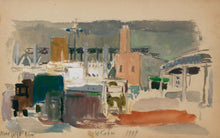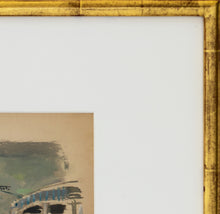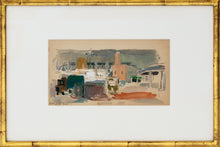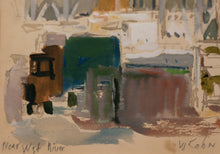Wolf Kahn (1927-2020)
Near the West River, 1949
Watercolor on paper
5.5 x 8.5 inches
Framed Dimensions: 11.75h x 15.25w x 1d inches
Though Kahn painted very few watercolors because the medium was unforgiving and did not allow him to "work" the painting until he was satisfied, his mastery of the medium is evident in this work.
Wolf Kahn is known for his fusion of color, spontaneity and loose brush strokes, which create the luminous and vibrant atmospheric landscapes and color fields. Kahn’s unique blend of American Realism and the formal discipline of Color Field painting sets his work apart from his contemporaries.
According to his painting student J. Steven Manolis, when Kahn traveled, he always painted with pastels because they were easy to transport. He also started his painting day with a 2-3 hour session of pastels. Kahn would say, "Pastels are my calisthenics before painting with oils on canvas." He would joke, "I breathe, I pastel." He considered pastel to be the "equivalent of dust from butterflies wings." His pastel technique would include placing the pastel on paper and then rubbing and smearing the pastel on the paper with his fingertips.
Almost all Wolf Kahn oil paintings were scaled up versions of an earlier pastel. Most art historians and art critics consider Wolf Kahn to be one of the most significant pastel artists ever, and certainly since Degas.








